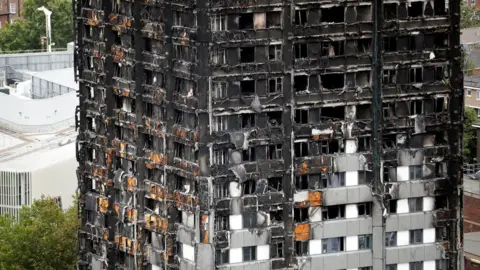Grenfell Tower: 82 buildings fail new fire safety test
 Reuters
ReutersEighty-two buildings have failed a new fire safety test set up in the wake of the Grenfell Tower fire, ministers say.
The test examines the safety of building cladding and insulation in combination.
It comes as an independent review of building regulations and fire safety has also been announced by the government.
It will look at current building regulations and fire safety, focusing on high-rise residential buildings.
The fire at Grenfell Tower block on 14 June in North Kensington, London, killed at least 80 people.
Of the 82 buildings that failed the latest test, 47 are local authority or housing association-owned or managed.
The new fire safety test is the first of a wave of more comprehensive assessments, which come after previous tests were carried out on hundreds of cladding samples in recent months - many of these failed standards for flammability.
The government says these new "whole system" tests simulate tall buildings by testing the insulation and cladding materials in conjunction with one another when set on fire.
Nine blocks in Salford are among those who failed the latest tests. They are currently having their cladding system removed and replaced, the city council has said.
Jay Loftus, a former firefighter living in one of the Salford towers, told BBC 5 live that the council was "quoting two years to take this stuff off. There are nine blocks and we are into tens of millions of pounds".
He said he did not feel safe in the tower block. "The attitude has been that it's a rolling programme of two years [to take cladding down]. What happens in between?"
Necessary improvements
The independent review will be led by Dame Judith Hackitt, of the Manufacturers' Organisation.
It will report report jointly to Communities Secretary Sajid Javid and Home Secretary Amber Rudd.
The review will examine:
- the regulatory system around the design, construction and on-going management of buildings in relation to fire safety
- compliance and enforcement issues
- international regulation and experience in this area
Mr Javid said building regulations and fire safety needed to be looked at "urgently".
He added: "This independent review will ensure we can swiftly make any necessary improvements. Government is determined to make sure that we learn the lessons from the Grenfell Tower fire and to ensure nothing like it can happen again."
 Getty Images
Getty ImagesAs part of the review, Dame Judith will consult the buildings regulations advisory committee - which advises the government on changes to building regulations - as well as the construction and housing industry, the fire sector, international experts, MPs and the public.
Dame Judith said: "I am keen to engage widely with industry and the public to inform the recommendations from the review. I want the recommendations to lead to any necessary improvements in the system being made."
Lord Porter, chairman of the Local Government Association, said the Grenfell Tower fire had exposed a systemic failure of the current building regulation system.
He added: "With test fails on buildings owned by a range of landlords across the country, we are pleased the government has accepted our call to begin an urgent and immediate review of building regulations. Local government must play a central role in this review from the outset."
Terms of reference for this independent review will be published in summer 2017, once the terms of reference for the Grenfell Tower public inquiry have been agreed.
This inquiry is likely to consider in detail whether the nature of the building regulations contributed to the fire, but it is unlikely the impact of the regulations elsewhere in the country will be part of its scope.
An interim report is expected before the end of the year and a final report should be published no later than spring 2018.